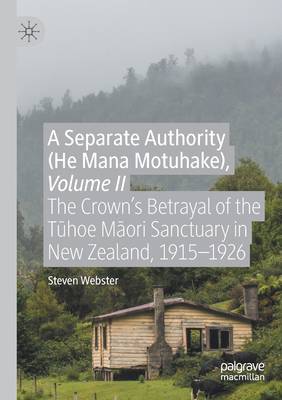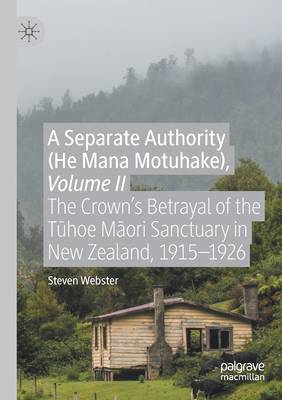
- Afhalen na 1 uur in een winkel met voorraad
- Gratis thuislevering in België vanaf € 30
- Ruim aanbod met 7 miljoen producten
- Afhalen na 1 uur in een winkel met voorraad
- Gratis thuislevering in België vanaf € 30
- Ruim aanbod met 7 miljoen producten
A Separate Authority (He Mana Motuhake), Volume II
The Crown's Betrayal of the Tūhoe Māori Sanctuary in New Zealand, 1915-1926
Steven WebsterOmschrijving
Following on from Volume I on the formation of the Urewera District Native Reserve, this monograph examines the period from 1908 to 1926, during which time the Crown subverted Tūhoe control of the UDNR, established a mere decade earlier. While Volume I described how the Tūhoe were able to deploy kin-based power to manipulate Crown power as well as confront one another, this volume describes ways in which the same ancestral descent groups closed ranks to survive nearly two decades of predatory Crown policies determined to dismantle their sanctuary. A relentless Crown campaign to purchase individual Tūhoe land shares ultimately resulted in a misleading Crown scheme to consolidate and relocate Tūhoe land shares, thereby freeing up land for the settlement of non- Tūhoe farmers. By the 1950s, over 200 small Tūhoe blocks were scattered throughout one of the largest National Parks in New Zealand. Although greatly weakened by these policies in terms of kinship solidarity as well as land and other resources, Tūhoe resistance continued until the return of the entire park in 2014--with unreserved apologies and promises of future support.
In both volumes of A Separate Authority (He Mana Motuhake), Webster takes the stance of an ethnohistorian: he not only examines the various ways control over the Urewera District Native Reserve (UDNR) was negotiated, subverted or betrayed, and renegotiated during this time period, but also focuses on the role of Māori hapū, ancestral descent groups and their leaders, including the political economic influence of extensive marriage alliances between them. The ethnohistorical approach developed here may be useful to other studies of governance, indigenous resistance, and reform, whether in New Zealand or elsewhere.
Specificaties
Betrokkenen
- Auteur(s):
- Uitgeverij:
Inhoud
- Aantal bladzijden:
- 452
- Taal:
- Engels
Eigenschappen
- Productcode (EAN):
- 9783030410483
- Verschijningsdatum:
- 8/07/2021
- Uitvoering:
- Paperback
- Formaat:
- Trade paperback (VS)
- Afmetingen:
- 148 mm x 210 mm
- Gewicht:
- 562 g

Alleen bij Standaard Boekhandel
Beoordelingen
We publiceren alleen reviews die voldoen aan de voorwaarden voor reviews. Bekijk onze voorwaarden voor reviews.











